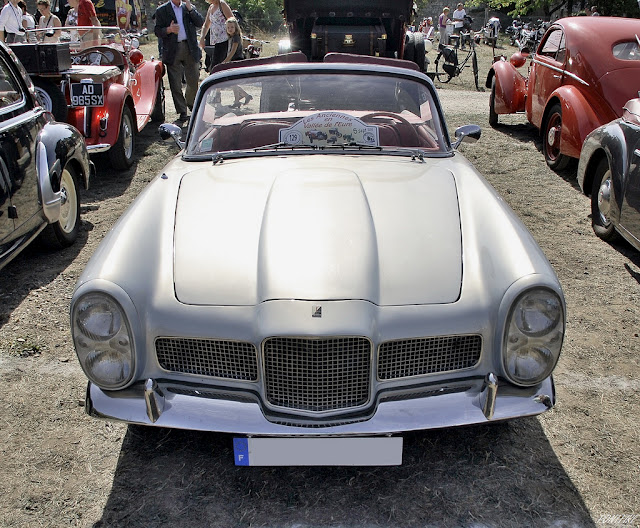Facel was a French manufacturer of automobiles from 1954 to 1964. In 1960, Facel entered the sports car market with the Facellia, a small car similar in size to the then popular Mercedes 190SL. Facellias were advertised in three body styles: cabriolet, 2+2 coupé and 4-seat coupé — all with the same mechanicals and a 2,450 mm (96.5 in) wheelbase. Styling was similar to the Facel HK500, but with rather elegant (though fingernail-breaking) flush door handles. Following Facel Vega's demise several of M Daninos's styling cues were "borrowed" by Mercedes-Benz. Prices were roughly US$4,000 for the Facellia.
The Facellia had a 4-cylinder 1.6 L DOHC engine built in France by Paul Cavallier of the Pont-à-Mousson company. The engine had only two bearings supporting each camshaft, using special steels, as opposed to the usual four or five. Despite the metallurgical experience of Pont-à-Mousson, this resulted in excessive flex, timing problems and frequent failures. In August 1961, Jean Daninos, the company's president obliged to resign in response to the company's financial problems. The new boss, a former oil company executive called André Belin, gave strict instructions to the after-sales department to respond to customer complaints about broken Facellia engines by replacing the units free of charge. The troublesome engine was replaced with a Volvo B18 powerplant in the Facel III, but the damage was done. Production was stopped in 1963 and despite the vision of it being a "volume" car only 1100 were produced, which is Facel's highest production number. The small Facellia met with little success and the losses from this, due to strong competition at the luxury end of the market, killed off the company. (wikipedia)
Deliveries of Facel Vega Facellia started from the summer of 1960. However, the first Facellia owners were pretty disillusioned. The mechanical design of Pont-à-Mousson suffered from many shortcomings: insufficient cooling, wet resisting liners wear causing excessive oil consumption, etc. In March 1961, the Facellia experienced its first evolution with the F2 (which replaces the FA type). Apart from the original Cabriolet version, the model range increased to include a 2-seater Coupé (a convertible with a hard top welded to the body) and a 4-seater Coupé. On Facellia F2, the Pont-à-Mousson engine was seriously strengthened. Now it developed 120 hp. (automobile-sportive.com)
Deliveries of Facel Vega Facellia started from the summer of 1960. However, the first Facellia owners were pretty disillusioned. The mechanical design of Pont-à-Mousson suffered from many shortcomings: insufficient cooling, wet resisting liners wear causing excessive oil consumption, etc. In March 1961, the Facellia experienced its first evolution with the F2 (which replaces the FA type). Apart from the original Cabriolet version, the model range increased to include a 2-seater Coupé (a convertible with a hard top welded to the body) and a 4-seater Coupé. On Facellia F2, the Pont-à-Mousson engine was seriously strengthened. Now it developed 120 hp. (automobile-sportive.com)
Facel Vega Facellia F2 4-Seater Coupé
Facel Vega Facellia F2 Cabriolet
Facel Vega Facellia F2 2+2 Coupé
(Photos from classicargarage.com, finecars.cc & flickr.com)






































































































